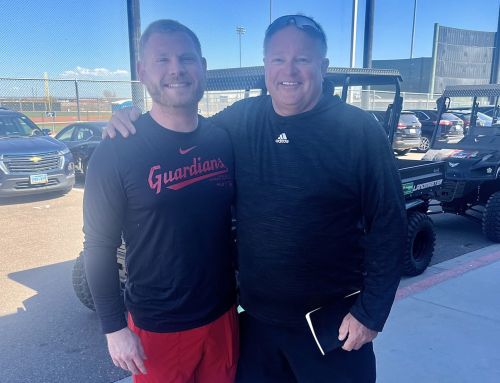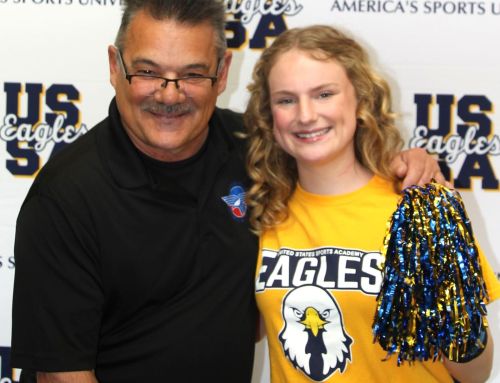What Is a Sports Information Director, and Why Might It Be the Right Career Path for You?
Experience matters. For Karen Carty, her Master of Sports Science degree in sports management from the United States Sports Academy gave her the tools and techniques to find success at the highest levels of college athletics.
“I knew I wanted to work in sports, and I felt that the classes offered by the Academy would properly prepare me for the career I wanted,” says Carty, who was impressed by the Academy’s expansive network of graduates. Carty, who started her career in sports marketing and media relations, is now assistant commissioner for media relations with the Mid-Eastern Athletic Conference and its eight historically Black colleges and universities.
Colleges, universities, professional sports teams and athletics conferences and organizations rely on professionals, like Carty, who are expert communicators and are adept at getting information in the hands of fans and media alike. Much of this work is tackled by a sports information director, someone who works to publicize the accomplishments and efforts of athletes and others associated with a team, program, league or sport.
If you’re looking into a career as a sports information director, here are four questions to consider before taking the plunge.
What is a sports information director?
Think of sports information directors — otherwise known as an SID — as public relations professionals. These experts serve as a liaison between a team, program, sport or league and the media and its fans. Sports information directors are generally well connected to administrators and executives, coaches, athletes and other stakeholders within their area and spend much of their time:
- Providing relevant content to media outlets. SIDs work with local, statewide and national media outlets as well as journalists and others to secure coverage of their team, program, league or sport.
- Creating content for your team, program, league or sport. As an SID, you will be tasked with communicating and sharing highlights, feature stories and profiles directly to your fan bases and for media consideration and consumption.
Where do sports information directors work?
Now that you know more about what is a sports information director, it’s also important to know where these professionals work. You might find SIDs:
- Leading sports coverage and communication at a high school, small college or university. These positions are beneficial for individuals who tend to love all sports.
- Collaborating with another SID. SIDs frequently work with others who handle a few sports at a larger college or university or with a professional sports franchise. You might be interested in these jobs if you have a love or passion for a certain sport.
- Representing a conference or sports league. This role also entails promoting a league’s interests to audiences locally, nationally and around the country. You may want to pursue this career path if you’re looking to eventually move into an administrator role.
What is a sports information director’s job on a daily basis?
No two days are the same as a sports information director. Some of your duties may include:
- Compiling relevant statistics and information about your team, program, sport or league
- Coordinating press conferences and interviews
- Issuing credentials to local, state or national media outlets
- Producing content for media guides, social media or websites
- Tracking trends within your field to better communicate to fans and media outlets
What skills do most successful sports information directors have?
Sports information directors must have a love or passion for sports and the teams, programs or organizations that employ them. Besides an interest in athletics, what is a sports information director needing to succeed?
Here are three skills our graduates tell us help them thrive as a sports information director:
- Sports information directors need to be equipped with strong written and verbal communication skills. You may be tasked with writing features, media guides, emails or other communications, or you may need to communicate with other sports teams and the media. Being an adept communicator will help you succeed.
- Working within sports is a fast-paced environment. As a sports information director, you may be collaborating and partnering with multiple sports teams and many athletes. That means you will need to be well organized to keep track of every project you’re juggling.
- Because you will be working with an ample amount of numbers and statistics, a sports information director will need to have strong abilities to gather and compile this information in a way that is useful for consumption by both fans and the media.
“Earning my degree from an institution that only focuses on sports made sense because I knew I was going to be trained by faculty who were well versed in teaching a sports curriculum.” — Karen Carty
How to become a sports information director
The United States Sports Academy can help you take your passion for sports and turn it into a profession. Throughout your coursework, you’ll gain the knowledge and know-how needed to prepare you for your next career move.
At the Academy, you’ll benefit from:
- 100% online course options. Complete your coursework anywhere and on your schedule.
- Learning from sports communication experts. Gain mastery from the many USSA faculty who have the highest degrees in their field and bring ample expertise from the field into your classes.
- Tailorable degree options. Customize your education to your needs, including our FastTrack option that gets you career-ready in as little as 15 months.
Take the next step today and learn how the United States Sports Academy can help you become a leading sports information director.





